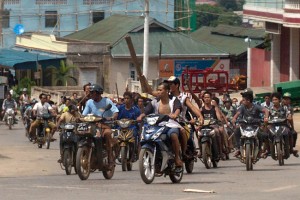Burma Government Must End Impunity and Promote Religious Tolerance
By Burma Partnership • June 4, 2013 This week, mosques, schools and shops were burnt down, Muslims populations displaced, people injured and killed, and journalists attacked. These dramatic events are now common news coming out of Burma. In the last three months, religious violence took place in more than 18 townships hundreds of kilometers apart from each other, more than 44 people died, and more than 13,000 have been displaced. Yet, no appropriate actions have been taken to halt the spread of violence, extremist religious views and distrust among communities.
This week, mosques, schools and shops were burnt down, Muslims populations displaced, people injured and killed, and journalists attacked. These dramatic events are now common news coming out of Burma. In the last three months, religious violence took place in more than 18 townships hundreds of kilometers apart from each other, more than 44 people died, and more than 13,000 have been displaced. Yet, no appropriate actions have been taken to halt the spread of violence, extremist religious views and distrust among communities.
On 28 and 29 May, violence spread to Lashio, Shan State, where one Muslim was killed and four Buddhists wounded. Mobs of young men on motorcycles roamed the city with swords, destroying shops and shouting they would “kill any Muslims they see on the road.” Two Democratic Voice of Burma reporters were injured and their SIM cards stolen. The police again failed to stop the violence and protect the population. According to a New York Times source, the first police units arrived two hours after the violence started and did not confront the rioters. More than 1,400 Muslims were displaced and found shelter in a Buddhist temple. On the night of 29 May, violence spread to the town of Mone in Kyauk Gyi Township, Pegu Region, where mobs destroyed a mosque and madrasa.
There have been numerous calls from the United Nations to hold perpetrators accountable, and the government has so far failed to adequately address the situation. According to the Ministry of Information, dozens of people have been arrested for their suspected roles in the fighting, and yet another committee will be formed “to investigate and determine who instigated the unrest.” Previous committees to investigate different problems in the country have not been impartial, and have by and large not resulted in accurate reports or constructive recommendations. Groups of Buddhist extremists continue to freely travel around the country diffusing hate speech. So far, charges have only been pressed against Muslims and there have been no reports of Buddhists being charged for taking part in anti-Muslim violence in central Burma and Oakkan in Rangoon Region.
The government of Burma must ensure that perpetrators of violence are prosecuted regardless of their religious or ethnic affiliations and in compliance with international standards of due process of law. It is fundamental that the international community keeps pressuring the government to end impunity for acts of violence and discrimination and monitors that the emerging trend of charging and sentencing mainly, if not only, Muslims does not continue and become a new form of discrimination.
An end to impunity is essential. However, accountability and upholding the rule of law are not enough to tackle this human tragedy. As explained by Physician for Human Rights, “the government’s weak response to stop the violence and its reluctance to help Muslim victims is a symptom of a larger problem—ethnic groups are not benefitting from fledgling democratic reforms […] it is a continuation of abuses against ethnic groups that are done with impunity and either tacit or outright government approval.” Religious and ethnic discrimination and Buddhist nationalism have been institutionalized by successive military regimes over decades. The continued violence, and government’s failure to end it, underline questions about the willingness and ability of an overwhelmingly Buddhist government to maintain long-term peace and stability among the country’s many other ethnic and religious groups.
The government, the State Sangha Council and local communities must address the root causes of the religious conflict. Pressure must be increased on the government to transform speeches into actions. To transition to a truly peaceful and democratic country, there must be national reconciliation, including ending religious and ethnic minority discrimination and intolerance, and promoting a harmonious religious and ethnically diverse Burma.
Tags: Burma Partnership, Impunity, Muslims, Shan, ViolenceThis post is in: Blog
Related PostsBurma Partnership Celebrates Continuing Regional Solidarity for Burma and Embraces the Work Ahead for Progressive Voice
Burma Army Displays Blatant Disregard for 21st Century Panglong Peace Process
Ann Din Coal Power Plant: Local Movement and Action to Preserve and Protect Natural Resources and Land: Mon IDP Report Case Study #4
Latest Human Rights Abuse Case Demonstrates Urgent Need to Reform the Myanmar National Human Rights Commission
Human Rights Far From Guaranteed as US Sanctions on Burma Are Removed









 All posts
All posts